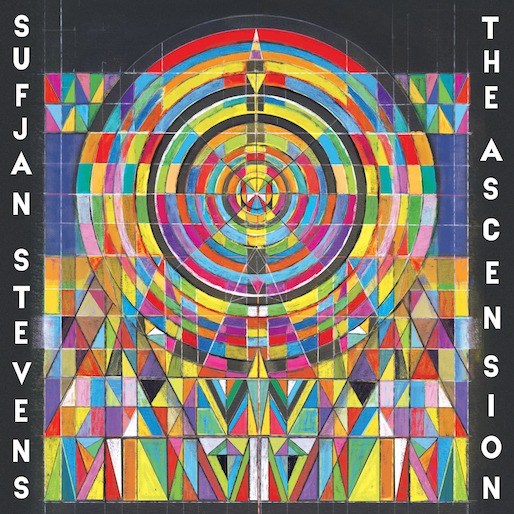“I shouldn’t have looked for revelation,” Sufjan Stevens sings on “The Ascension.” “I should have resigned myself to this.”
For 20 years, Stevens’s songs—their genres ranging from bare-bones indie to pop electronica—have reckoned with religion. On his latest album, The Ascension, global issues, rather, come to the forefront. Suddenly, looking to the heavens seems less essential; if you ignore pressing, earthly issues, you’re complicit. A sonic sibling to 2010’s electro-pop Age of Adz and a direct follow-up to 2015’s autobiographical, folk-orchestral Carrie and Lowell, The Ascension looks outward.
Mired in anxiety, The Ascension’s existential questions are numerous (“What’s the point of [love] when everything’s dispossessed?,” “Is it all for something? Is it all part of a plan?,” or simply the refrain, “What now?”). While these questions are concerned with death, rebirth and determinism, they also apply to global concerns and American civilization—topics Stevens has never before tackled in such depth.
“Video Game” is a poppy plea for individual agency that protests against idolization: “I don’t care if everybody else is into it / I don’t care if it’s a popular refrain / I don’t wanna be a puppet in a theater / I don’t wanna play your video game.”
He’s poking a bit of fun—after all, nearly all the album’s song titles are clichés or references to pop culture. And though he refutes an indoctrinating refrain on “Video Game,” Stevens is partial to refrains of his own. “Die Happy” opens with an eerie, twinkling piano, “I wanna die happy” the sole lyrics. Opening track “Make Me An Offer I Cannot Refuse” hinges on the repetition of its title. “Sugar” asks, “Come on baby give me some sugar.” “Ursa Major” loops an undeniably catchy “Oh, to love you.”
There’s something to be said for lyrical refrains whose melodies remain unchanged even as the music around them does: It looks at a lyrical block as a looped instrumental track, which singers usually espouse in favor of variation. Regardless of repetition, Stevens’s gentle, hushed voice cuts through the production like a fog light. It’s an essential counter to the album, which he called “bossy and bitchy.”
And at the beginning, The Ascension is assertive and driven. “Make Me An Offer I Cannot Refuse” builds with an anxious, growing cacophony that suddenly drops out into one soft note. “Ativan” is a jarring ode that errs personal; Steven’s voice calls through a chasm of dissonant percussive rhythms, as destabilizing as his panic pre-medication.
Twice on The Ascension, we find someone in the fetal position: on “Ativan” (“I feel just like an embryo… Put my head between my knees”) and “Gilgamesh” (“Now place your head below your waistline / Breathe deeply as the pain subsides”). For a topically expansive album, there’s still a fair amount of focus on the individual, internal world. But that makes sense: Our feet are falling out from under us, whether we’re losing ourselves to love (“Landslide”) or the overwhelming world.
But with an 80-minute runtime, The Ascension feels overwhelming in its second act. “Ursa Major” simply overworks itself, too buzzy a follower to “Ativan.” The run from “Gilgamesh” to “Goodbye To All That” drags. “Sugar” would do far better without its three-minute instrumental introduction—that’s made clear by its music video, where the beginning is sliced off entirely. However, the undeniably creepy, sensual “Sugar” does bring the album back on track. It ends with the stunning, intimate title track and the final track, “America.”
“America” may be the song where refrains work best. At 12 minutes long, the song grows progressively wearier, pleading, “Don’t do to me what you did to America.” It’s a list of grievances, every line another injustice.
But worried as it is, The Ascension isn’t without joy. While “Tell Me You Love Me” urges a lover for validation, it ends on a decisive note of hope: “Can we carry this love? It’s now or never / I’m gonna love you. I’m gonna love you every day.”
Caitlin Wolper is a Brooklyn-based journalist and poet whose work examines culture, music, identity and more. She’s written articles for the New York Times, Rolling Stone, Vulture and others, and her poetry chapbook, Ordering Coffee in Tel Aviv, is out now via Finishing Line Press. She gets very excited about music, line breaks, and memes on Twitter at @CaitlinWolper.




